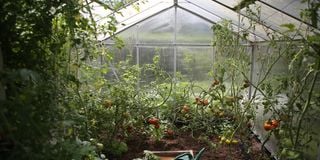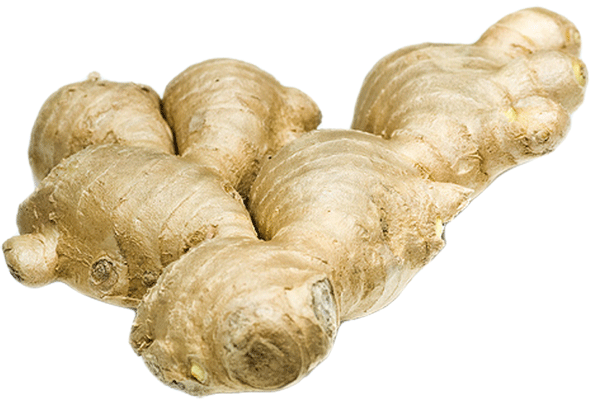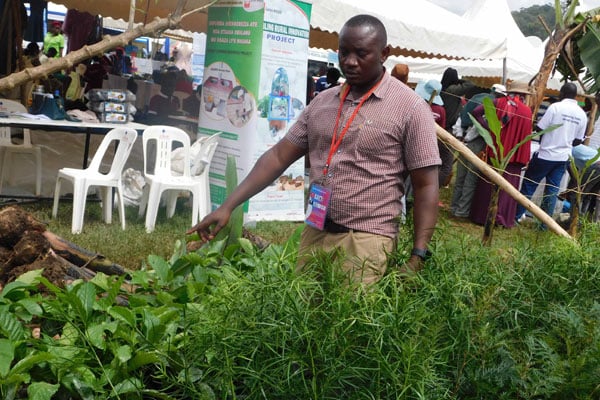Plant care tips for a disease-free garden

What you need to know:
It is important to learn how plants interact with each other. Sometimes there is a chemical warfare between certain plants when planted next to each other. Proper plant spacing will limit such problems
Knowing that you can finally do some gardening in your backyard, can be such joyous feeling. However, for many, the excitement is short-lived, when the plants start flowering only to start drying up. This, is usually due to a number of factors, such as poor gardening and maintenance, soil infertility and weather.
Another common, but normally ignored factor is plant infection and diseases. Plants, just like human beings, are susceptible to disease, which is why it is important to create an environment that is disease-free.
To achieve this, it is important to prevent disease by paying careful attention to plant selection and plant care. Below, we discuss a few helpful, tips to help you keep your garden healthy.
Select with healthy plants
Purchase plants that are disease-free and have been grown in a reputable nursery. This will greatly reduce the chances of introducing a disease into your garden. When you bring new plants home, inspect them carefully for signs of disease or pest damage before planting them in your garden.
If you are buying potted plants or bedding plants, gently knock the plant from its container and check the root system. Look for healthy light-coloured roots. Blackish and slimy roots according Huda Nassali, an expert designer, are a sign of poor root health and root rot disease.
Use disease-resistant plants
Selecting plants with genetic disease resistance is the best way to prevent disease. Before you plant anything, whether it is a vegetable, a herb, a flower, or a bush, it is important to gauge just how much time you will have to tend to your plants. If you know, that you will not have the time, to keep weeds, pests, and diseases at bay, then you are better off choosing plants, that are resistant disease. Nassali explains that in as much as no plant is completely disease-free, some plants have fewer major disease problems, as the seeds are genetically bred to resist infection.
“Disease resistant seeds and plants will not only prevent disease, but they also help you save up on the time and money spent to manage a diseased plants. You will have to spend money fungicides and fertilisers, to support it” Nassali notes.
Some plants have multiple disease resistances except for one specific disease and if that disease is a problem in your area, then these plants will not thrive.
Other plants are disease-tolerant, meaning they may still get the disease but grow well despite it. Get a handle on the diseases of the plants you want to grow, this will help you make the right selections, instead simply choosing what is aesthetically appealing. The best way to do this is by seeking assistance from a professional gardener of your choice.
Choose the right plants
Soil PH according Nassali, a gardening expert is a determining factor when it comes to some plants.
“If you can, pay for a soil test before you set your garden or lawn, many have paid later. Take for an alkaline soil, some acid-loving plants will grow reasonably well for years as they reap the benefits of the soil in their root ball, but then begin to decline as they encounter more and more of the native alkaline soil” Nassali explains.
She adds that many plants are also sensitive to environmental conditions, and advices not to make assumptions about plant tolerances in general.
“Find out how the varieties that you want to plant tolerate sun, wind, and various soil conditions” she adds.
It is also important, to learn how plants interact, there is a chemical warfare that can exist between certain plants when planted next to each other, causing non-infectious diseases. A more mundane type of plant interaction is competition for water, nutrients, and sunlight. All too often, landscape trees are planted too closely together. Proper plant spacing will limit such problems and help prevent diseases in the long term.
Properly rotate your plants
Proper rotation of plants can help prevent the spread of disease. Different types of plants have different disease susceptibility, so by rotating them, you can reduce the chances of a disease spreading from one plant to another. For example, if you have had a problem with a fungal disease in one area of your garden, it is best to avoid planting the same type of plant in that area for at least a few years.
“Simply put, crop rotation, works like a technique for combating pests and diseases because, by interrupting the pests and disease cycle. Take for instance if you had planted had beans and they didn’t yield due to an affection, planting maize, which is resistant to that infection may help with doing away with it over time” Nassali explains.
Keep your garden clean
Keeping your garden clean is essential for preventing plant diseases. Remove dead leaves, plant debris, and weeds from your garden to reduce the number of disease-causing organisms.
Maureen Lulume, from Makeover Lawns and Gardens, shares that proper gardening sanitation, will also prevent the spread of pathogens to other plants. “In most cases disease microorganisms will remain in the soil for a very long time, even after the affected crop or plant is uprooted, so to prevent it from spreading, the garden tools the hoe’s the rakes, your own boots that you wear when managing a pile of diseased debris all this can help you prevent passing on plant diseases” says Lulume
Pruning is another important disease preventive. Prune when you first notice the disease; if you wait too long, pruning will not be effective. When dealing with highly infectious diseases sanitise tools with alcohol between pruning cuts. Clean and remove soil from tools periodically. When pruning, make cuts on healthy tissue first, and prune out diseased tissue last. Through proper pruning you can also keep a tree’s inner foliage from becoming too dense, assuring better air movement and sun penetration of the canopy.
Water your plants properly
Watering your plants properly is crucial to preventing plant diseases. Overwatering or under watering plants can lead to disease. Water your plants at the base, avoiding getting water on the leaves and ensure that the soil has proper drainage.
“Avoid getting water on the leaves of plants when watering them because it can lead to several issues such as fungal and bacterial growth. Water on the leaves can create a humid environment that is conducive to fungal and bacterial growth. Also, when water droplets are splashed onto the leaves, they can spread fungal spores and bacteria from one plant to another, which can lead to a widespread outbreak of disease in your garden” Lulume explains.
Be mindful of the weather, too little water can stress plants, making them more susceptible to disease organisms. Excessive watering results in poor overall root function and greater susceptibility to root rot diseases. During hot seasons, you may need to water more frequently.
Fertilising plants will both prevent non-infectious diseases (disorders), such as nutrient deficiencies, and help plants tolerate the damage resulting from infectious diseases. Use appropriate fungicides, pesticides and bio pesticides to protect plants from disease-causing organisms.
Use mulch
Mulching, can also help prevent soil-borne diseases. Mulch can help keep the soil moist and cool. This is particularly important for plants that are susceptible to fungal diseases. Organic mulches are the best choice according Maureen Lulume from Makeover Lawns and Gardens .
Lastly, watch for signs of disease, keep an eye out for signs of disease, such as wilting, discolouration, or abnormal growth patterns, and take action if you notice any symptoms. This will help you catch a disease early and take steps to prevent it from spreading. If you suspect that a plant has a disease, consult a gardening expert or local extension service for advice on how to treat it. By following these tips, you can help prevent plant diseases in your home garden. A healthy garden will not only look beautiful, but it will also provide you with fresh fruits and vegetables for your table depending on the type of garden you have.




